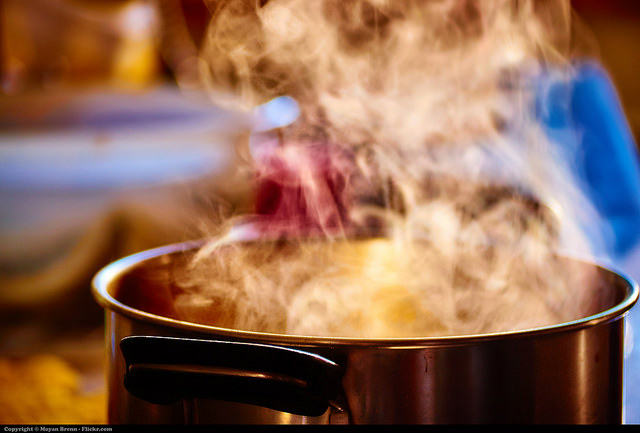It is late afternoon and I’m peeling potatoes in the kitchen, standing barefoot on a fringed rug that fails to sufficiently hide the ugly, old brown linoleum.
As my thoughts hover behind me at the oven and noisily debate dinner, the smell of earth wafts up to arrest my attention. My hand stops mid-motion.
I raise the smallish, rust colored tuber to my nose and inhale as deeply as if it were a flower or fruit.
Despite the clean, washed condition it smells distinctly of soil—a much-loved scent that makes me smile. The earthy fragrance of the potato’s red skin awakens my olfactory senses and brings me crashing into the present experience. All my attention focuses upon what I am doing, riveted to the moment.
I inhale a deep breath and feel my shoulders soften, while the aroma opens my eyes and I suddenly see this thing differently: a gift of the earth and a storehouse of life, cleverly disguised as a humble, organic potato.
The French call potatoes “pommes de terre” (apples of earth), a description that I always found charming but also a bit odd. Certainly they are connected deeply to soil…but apples?
I must be missing something.
I am working with my French peeler, a decidedly different instrument than its American cousins. It’s a good tool, nicely made, and I appreciate the sturdy feel of it as I pull the notched, stainless steel blade towards me (rather than pushing it as with most swiveling American-style ones), following the contours of the tuber. The thin, smooth skin of this “apple of earth” falls away in long strips, revealing its glistening, creamy interior. It gives off a sweetly chalky scent quite distinct from the earthy skin.
My thoughts had been elsewhere until the beguiling, unexpected fragrance transported me back to the kitchen. Peeling its skin, the soil-like scent of pomme de terre brings me fully into the moment and my body.
Our senses are the threshold where we engage the world around us. In this tactile, sensual connection with the food in my hand, there is something elemental that feeds the soul as surely as the food itself. Perhaps the word that most accurately captures both is nourishment.
How do we nourish body and soul? Over the years, I have learned that deep truth exists in the cliché: you are what you eat.
What are you eating? How was it grown—sustainably or not? Locally or far removed from your locale? How did it come to you? From seed to harvest to sale, who did it benefit and nourish?
A jumble of local, organic green beans I purchased yesterday at the market, still satisfyingly fresh and crisp, are piled atop the counter. Alongside the rusty skinned potatoes, the emerald color of the beans is so compelling against the dark tiles that I almost want to stop my work and attempt to paint the scene.
In a somewhat battered roasting tin, a free-range chicken rests quietly, plump legs demurely trussed together with a bit of kitchen string. I’ve massaged the innards with a mélange of coarse salt, chopped parsley and minced garlic, and rubbed the skin with Spanish olive oil, sprinkling it liberally with fine sea salt and herbes de Provence.
To accompany this Mediterranean-style chicken, roasted herbed potatoes and green beans, I have pounded and whisked a quivering bowl of pungent, garlicky aioli in a Provençal mortar and pestle.
For me, being in the kitchen is its own form of setting things right, even when the day has unfolded in a manner other than how I wished.
Here among a vivid assortment of fresh, beautiful ingredients that awaken my senses, I create a simple, elegant meal to celebrate our connection to place, season, to each other. And of course, to Earth.
For one kind of cook, a significant part of being in the kitchen is the assembly of the meal itself; a sensory, creative process to be savored and enjoyed right down to the weighty heft of quality pans, the ease of sharp knives, and the feel of good tools in the hand. It’s a soul thing.
For the other kind of cook, assembling a meal is largely work. Drudgery, even. It’s something to be done, simply an obligation to feed the family (or self).
On almost every day of the year, you will find me happily camped among the former, basking in the sensory rapture of fresh herbs and fine ingredients. Celebrating life.
No matter our chosen cuisine, to a soulful cook every one of the ingredients gathered for a meal offers a sensory delight in its own right. The tools and vessels, too. It’s difficult to adequately describe the feeling of contentment—a delight that can border upon joy—from the simple act of, say, mindfully peeling a potato’s earthy skin or chopping a fresh, rowdy bunch of fragrant cilantro.
I’m a passionate cook, one who believes that far more exists to good food than simply taste, quality, cost, calories or complexity. The whole is more than the sum of its parts, and I feel there is something essential in the care, attention and love that we bring to what we create in the kitchen.
In life it is the invisibles that are often most important: trust, love, compassion, integrity. Cooking is no exception. Food with integrity and prana (life force), prepared with an open and generous heart, carries something unseen but essential. Grace, perhaps.
For the soulful cook, creating a delicious meal is a simple, daily ritual in a hand-crafted life, just as surely as sitting down to enjoy it with gratitude, friendship, laughter and love, shared with one’s chosen family. Whether or not you’re a cook (of either sort), a good meal invites us to expand through our senses, to emerge from the tired and confining stories of our life, savor the moment, and to celebrate something much, much larger. This, I think, is the true grace of the table.
Open your senses and celebrate.
Relephant:
Cooking: A Dying Art?
Author: L. R. Heartsong
Assistant Editor: JoJo Rowden/ Editor: Catherine Monkman
Photo: Moyan Brenn/flickr












Read 0 comments and reply